Healthcare Provider Referrals for Diabetes Prevention

Submission Date: August 2014
Entry Type: Case Study
State/Territory Submitted on the Behalf of: New York
States/Territories Involved: New York
Domain Addressed:Community-Clinical Linkages, Health Systems Strategies
Public Health Issue:- In New York State, 25-30% of the adult population, or 4.5 million people, are estimated to have prediabetes. Without lifestyle changes to improve their health, 15 – 30% of people with prediabetes will develop type 2 diabetes within five years.
- The Diabetes Prevention Program research study showed that making modest behavior changes helped participants lose 5 – 7% of their body weight and reduced the risk of developing type 2 diabetes by 58% in people with prediabetes.
- Many healthcare providers are not currently referring to the National Diabetes Prevention Program’s (National DPP) evidence-based lifestyle change program.
Ensure that a minimum of 30% of the total number of providers reached via academic detailing and other outreach will utilize the 2-1-1 and American Red Cross intake and referral system to refer patients into the evidence-based lifestyle change program.
Program Action:To facilitate healthcare provider referral, the New York Diabetes Prevention and Control Program (DPCP) created a fully functional healthcare provider referral system in three steps.
1) The DPCP contracted with QTAC and the P2 Collaborative to develop referral systems. To connect people to the evidence-based lifestyle change program, QTAC used a newly developed consumer portal and the P2 Collaborative added the lifestyle change program to two existing information and referral systems: 2-1-1 Western New York (WNY) and NY Connects. Both added the evidence-based lifestyle change program to their referral databases and were connected to the QTAC portal. 2-1-1 WNY is a confidential phone number that connects people to free or low-cost services in Western New York. NY Connects provides information and assistance on long term care so that people of all ages can remain independent. Both information and referral systems were set up to connect to the QTAC portal. The P2 Collaborative trained call center representatives from both organizations. In addition, the DPCP and the P2 Collaborative provided information and resources on diabetes prevention to WNY and NY Connects.
2) The DPCP linked healthcare systems and providers to the QTAC portal, 2-1-1 WNY, and NY Connects. All three were advertised in the healthcare provider toolkit, and the toolkits were disseminated to practices across Western New York. A kick-off event was held to introduce 150 health plan staff and healthcare providers to the referral systems.
3) The DPCP worked with community organizations to ensure lifestyle change program availability in all communities, including those at greatest risk. This gave healthcare providers confidence that their referrals would indeed connect patients to a lifestyle change program that was easily accessible to them. Through these three steps, the DPCP facilitated healthcare provider referral by providing multiple points of entry for referrals.
State Health Department Roles
- Contracted with the P2 Collaborative and QTAC to facilitate healthcare provider referrals through information and referral centers
- Assisted QTAC in building an online portal to promote the evidence-based lifestyle change program
- Solicited evidence-based lifestyle change program providers to join the QTAC portal
- Encouraged evidence-based lifestyle change program providers to submit program information to 2-1-1 WNY and NY Connects
- Facilitated strategic meetings and trainings with providers, health care system groups, and community organizations
- Built linkages with hospitals, health plans, provider groups, and community organizations through the Community Health Improvement Planning Process in all eight WNY counties
- Utilized new relationships with large health system partners to develop a foundation for diabetes prevention referral processes
- Acted as a neutral convener between all partners promoting the evidence-based lifestyle change program
Partners
- NYS Quality &Technical Assistance Center
- P2 Collaborative of Western New York
- 2-1-1 Western New YorkÂ
- NY Connects
“Public health and community partners must work together to increase prediabetes awareness and create demand for lifestyle change programs to tip the scales against the type 2 diabetes epidemic.” -Sue Millstein, NY DPCP
Data/Other Information Collected:Number of health systems, sites & providers reached
Impact/Accomplishments:- 15 Healthcare system partners
- 22 Healthcare delivery sites
- 700 Primary care providers
- 143,000 Adult patients served by participating healthcare delivery sites
Factors Supporting Success
- Dedicated Funding of $25,000
- Contract with QTAC to build capacity, establish infrastructure, and increase access
- Partnership with the P2 Collaborative
- Existing NYS clinical prediabetes algorithm
- Made county-level connections through the Community Health Improvement Planning Process
- Formed strong partnerships with healthcare providers across Western New York
- Expanded reach from two counties to eight due to the P2 Collaborative’s strong infrastructure
- Built community capacity to reach high risk communities in response to New York State Medicaid mandate that health plans provide programs to a certain percentage of their members
- Identified benefits from a provider’s perspective
Challenges and Solutions
Challenge: Some healthcare providers were reluctant to use the referral system if there were geographic gaps in evidence-based lifestyle change program availability or if their patients were unable to afford the program
Solution: Worked with two county Offices for the Aging and other community organizations to develop the capacity to implement the evidence-based lifestyle change program in these areas and met with health plans to explore reimbursement options and other ways to financially support implementation of the evidence-based lifestyle change program
https://www.chronicdisease.org/?NDPP_NY
Diabetes
State Contact Information:
New York
Sue Millstein
NYS Department of Health
(518) 408-5142
susan.millstein@health.ny.gov
